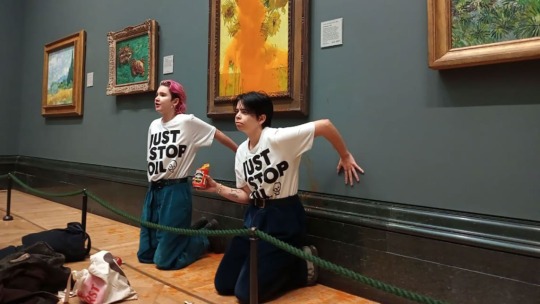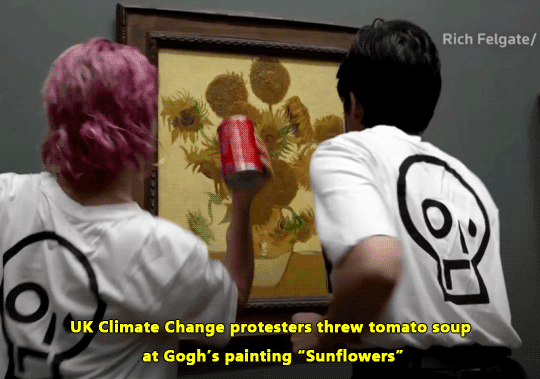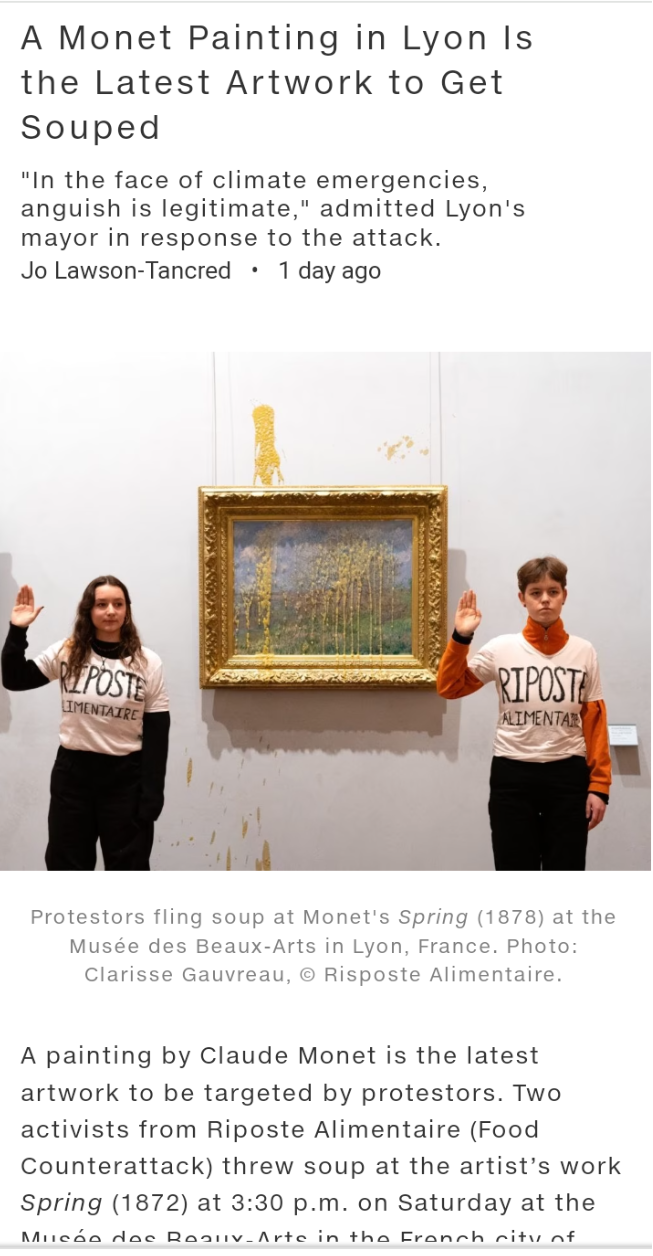#Just Stop Oil activists
Video





Just Stop Oil Protesters Throw Soup on Van Gogh's Sunflowers Painting
Just Stop Oil activists have thrown Heinz tomato soup over Vincent Van Gogh's masterpiece 'Sunflowers' at the National Gallery in London.
The protestors, wearing Just Stop Oil T-shirts, threw two tins of Heinz Tomato soup over the 1888 work - estimated to be worth £76 million - shortly after 11am today before kneeling down in front of the painting and appearing to glue their hands to the wall beneath it
Visitors were then shortly escorted out by security, who then shut the doors to room 43 of the gallery where the painting hangs.
After throwing soup on the painting - which has a glass cover - protestor Phoebe Plummer, 21, yelled: 'What is worth more, art or life? Is it worth more than food? More than justice? Are you more concerned about the protection of a painting, or the protection of our planet and people?
'The cost of living crisis is part of the cost of oil crisis.'
The National Gallery has confirmed that the painting was unharmed apart from 'minor damage' to the frame.
The Met Police said that both Just Stop Oil protesters have been arrested for criminal damage and aggravated trespass, and officers were working to 'de-bond' them.
Art historian Ruth Millington said: 'I think that attacking one of the world's most loved paintings, which I would call priceless, will not gain these protestors public support. That is what which they need in order to effect real change.
'What has happened today provides a perfect example of why the painting is protected by glass, luckily.'
Activist Anna Holland, 20, from Newcastle said: 'UK families will be forced to choose between heating or eating this winter, as fossil fuel companies reap record profits.
'But the cost of oil and gas isn't limited to our bills. Somalia is now facing an apocalyptic famine, caused by drought and fuelled by the climate crisis.
'Millions are being forced to move and tens of thousands face starvation. This is the future we choose for ourselves if we push for new oil and gas.'
The demonstrators were surrounded by a group of photographers and journalists when they attacked the painting, before the press were asked to leave by National Gallery Staff.
Police were called shortly afterwards to un-glue the climate activists from the wall of the National Gallery and arrested two people for criminal damage.
A National Gallery spokesman said: 'At just after 11am this morning two people entered Room 43 of the National Gallery. The pair appeared to glue themselves to the wall adjacent to Van Gogh's 'Sunflowers' (1888). They also threw a red substance - what appears to be tomato soup - over the painting.
'The room was cleared of visitors and police were called. Officers are now on the scene. There is some minor damage to the frame but the painting is unharmed.
'Two people have been arrested.'
In a tweet from the Metropolitan Police Events account, the force said: 'Officers were rapidly on scene at the National Gallery this morning after two Just Stop Oil protesters threw a substance over a painting and then glued themselves to a wall.
'Both have been arrested for criminal damage & aggravated trespass. Officers are now de-bonding them.'
#Just Stop Oil Protesters Throw Soup on Van Gogh's Sunflowers Painting#Vincent Van Gough#Just Stop Oil activists#National Gallery in London#art#artist#art work#art world#art news
49 notes
·
View notes
Text
The public wants to save the planet – as long as it doesn’t personally inconvenience them
“Back in July, Just Stop Oil (JSO) experienced something unusual – they found they were the ones being protested. An alternative group called Just Stop Pissing People Off attempted to block Just Stop Oil from engaging in disruptive protests and interrupted their events, saying that the climate crisis is real but that JSO is distracting and alienating people. The counter-protests tell us a great deal about Britain’s contradictory attitude to the climate crisis.
“Broadly, Brits understand that the climate crisis climate change is a major problem. 65% of us are worried about the climate crisis (versus just 28% who aren’t) while the same proportion supports the government’s aim of reducing Britain’s net carbon emissions to zero by 2050 ... Eight in 10 back more tree planting, subsidies for energy-efficient homes and higher taxes for high-carbon companies. 62% would support a requirement for all energy production to come from renewable sources. But this enthusiasm has its limits.
“When asked if they would back policies that would impose limits on what they personally can do, Brits quickly turn against them. For instance, two-thirds oppose the idea of a limit on how much meat they can buy, and a majority oppose banning petrol and diesel cars ... Even though 62% of voters back the idea of requiring all energy to be renewable, just 39% want to ban new North Sea oil fields, and a mere 32% want to prohibit the sale of gas boilers ...
“The British public is not as supportive of action on the climate crisis as many environmentalists would hope. We favour general, uncontentious ideas – net zero, tree-planting, tax rises on high-carbon companies – but when asked for our opinion on a climate policy that would directly affect us personally, we baulk. This is partly due to worries about the cost of living, but it’s also about avoiding personal inconvenience.
“Just Stop Pissing Everyone Off perfectly encapsulates the British attitude to the climate crisis: sure, it’s a problem, but not ours. As Homer Simpson once asked: ‘Can’t someone else do it?’”
#just stop oil#climate activists#climate activism#activism#climate crisis#climate breakdown#climate change#climate#tree planting#home insulation#low emission zones#renewable energy#renewables#oil and gas#fossil fuels#motorists#public opinion#brits#uk
281 notes
·
View notes
Note
I'm sorry if this isn't approriate, but I don't really understand why you find Les Mis a good target for a climate protest? I get that the musical has themes that align with the protesters but like... what was the good outcome? Are there really People in that audience that don't know climate change is happening? How Will this change their mind? What action is meant to be brought on by trowing soup at paintings or disrupting a performance? Does that actually help the cause of combatting climate change at all? Does it help make people more aware, does it have an effect on the mechanisms of polluters? Isn't there anything more focused that these resources (both money and the incredible bravery and drive of the People themselves) could be better focused on. These protest feels so different from like, people chaining themselves to a private jet or the schoolchildren going up to parliaments by the thousand to demand policy chances to better their future. All of the JSO actions feels so performative, I just don't see how they are actually doing anything of even the mechanism by which they are meant to accomplish anything? Which doesn't mean that the people involved aren't great people or that the reaction of the Les Mis crowd wasn't fucked up. Just... what was even the goal?
Hey! I know it's been a while since I made that post supporting the JSO protestors but I've gotten a few asks like this in the time since (and am still getting them) so I'm responding to this as the most good-faith one in my inbox and hopefully it answers others that have been asked to me in the past couple weeks as well. Disclaimer: If I'm responding to things outside the remit of this ask, it's likely that it's because someone else sent an ask about it and I've been juggling them all in my head as I've been thinking on a response.
I think in order to answer the first part of the ask we have to tackle the second. 'What has this action achieved' only works as a comprehensive criticism if we look at it in isolation to all of JSO's other actions. What I mean by this is: JSO launched by blocking oil refineries for days on end. In the two years they've been active they've done similar actions, including but not limited to disrupting fuel distribution centres, petrol stations, interrupting fossil fuel conferences, and, most recently, trying to stop the relocation of asylum seekers to prison barges. Their actions go far beyond blocking roads and disruption of public events. I think this is important to establish as I don't know how much of a working knowledge anyone not in the UK Climate movement actually has about JSO and I think it's good we're all on the same page.
But if they do all that (effective, important) direct action, then why target Les Mis? What does a West End show have to do with fossil fuel companies and climate change? And in response to these questions I'll ask one of my own: were you aware of the fact that JSO tried to stop migrants from being deported until I mentioned it just now? A lot of these actions, the ones that actually target infrastructure and confront those directly responsible, get little to no media coverage. When news of the Les Mis action first broke out, I saw so many people on Twitter with the same reactionary takes: why target Les Mis when the Conservative Party Conference literally happened the same weekend? And that's a fair and valid point- if it wasn't for the fact that JSO were at the conference. I know this because I was there too. They had a huge bloc in the march and went on to do other actions in the city after the march had ended. The whole thing, the entire 10,000+ strong protest, got maybe 30 seconds coverage on the local news and not even a mention of JSO's presence (or of climate change in general for that matter.) JSO's previous actions directed at fossil fuel companied themselves get very little, if any, coverage compared to their big flashy sports/awards show/performance interruptions.
So yeah, some of JSOs actions are 'performative'. But I don't think it's unreasonable to suggest that even performative actions have their place within the wider struggle. I understand not liking public disruption as a tactic and I understand the issues with it, but I also think it's worth reflecting on why groups like JSO use it.
Editing my draft here to report that earlier today they smashed the frame of a painting that was previously vandalised by the Suffragette movement in 1914. That's a performative action, sure, but you have to admit it makes a point. Just like the tageting of Les Mis, a play about an unjust society and the people striving to change it, makes a point about hypocrisy. It gets the media coverage. We can debate all day about the usefulness of that coverage and if chasing media headlines should be our goal in the first place... but at the end of the day, it's been proven that JSOs membership grows every time they do something like this. It gets more people to join, which means next time it comes round to blocking key infrastructure, they'll be in a stronger position to succeed.
This isn't to say don't criticise them at all! I actually think criticisms like this one are a key part of organising and, done with care, can only make our movements stronger. I have my own issues with JSO- namely, the carelessness with which arrest is actively encouraged/promoted as the only valid form of resistance- but that's a whole other conversation and one that doesn't undermine my support and solidarity for the activists who are doing those actions (and sacrificing a whole lot in the process.) I think mass direct action movements are rarely ever perfect but I also think we need to show solidarity first and foremost when people are trying to do the right thing, especially if how they're doing it is in conjunction with or as a response to other tactics.
#les mis#just stop oil#i know this is old news now but this was in my drafts and i feel like i should probably still post it given that JSO are in the news again#also disclaimer: since my last post i found out that not only do i know one of the ppl who interrupted les mis#but turns out we've actually taken direct action together in the past#and i'm not about to announce details of my ongoing court case on tumblr dot com#BUT i think it's also worth keeping in mind that a lot of these activists aren't only doing the 'performative' stuff#sometimes they also [redacted]
78 notes
·
View notes
Text
Van Gogh throwing a vase with sunflowers at one of Warhol’s Campbell Soup cans

#imitación al arte#life imitates art#van gogh#warhol#soup#sunflowers#activist#just stop oil#banksy#thrower
496 notes
·
View notes
Text


Reuters(Oct. 14 London's National Gallery)
The work is unharmed with only minor damage to the frame -The "Sunflowers" was covered by glass- according to the museum.
In recent months, climate activists have taken to museums across Europe to glue themselves to priceless works of art in an effort to call attention to the climate crisis. Targets have ranged from Sandro Botticelli’s Primavera at the Uffizi in Florence to the frame of Van Gogh’s Peach Trees in Blossom at London’s Courtauld Institute, to the base of the statue Laocoön and His Sons at the Vatican Museums.
Because the demonstrators never affix themselves to the works directly (opting for a frame, glass covering, or base), experts are divided over whether their actions threaten the objects’ safety.
more read at artnet
We know they would like to make people listen.
Nevertheless,
"The sadness will last forever"
#Vincent van Gogh#Gogh#art#climate change#environment#activists#just stop oil#paintings#Sunflowers#controvercial#fossil fuels#uk#london national gallery#Reuters#global warming#climate crisis
185 notes
·
View notes
Link
#i am foaming at the mouth#activists need to fucking stop doing this to artwork jfc#just stop oil#can't they do it on literally anything else#vincent van gogh#national gallery#environment#london#uk#van gogh#art#art gallery#news#breaking news
200 notes
·
View notes
Text
🚨Please sign this !🚨 No one should be arrested for protesting it is a right

#protest#sign this#petition#sign this petition#current#amplify#just stop oil#climate change#activist#activists#right to protest#peaceful protest#please share#please sign#fyp#amplify this#activism#share this
14 notes
·
View notes
Text

I finally drank the grown up koolaid
#oh yeah#just stop oil activists moan they’re running out of protest banners because irate motorists keep stealing them
3 notes
·
View notes
Text
worried that just stop oil is a psy op and think that activists could do better? congrats, you're an activist! it's time to join or start your own local climate justice group!
#like so many of these movements are deeply flawed but if your response to its shit isn't to start your own or join a better one then bruh#The call is coming from inside the house#Smug doom posting only makes the crisis come quicker#It doesn't help any of us unfortunately#We need a plethora of solutions and forms of action and one size fits all isn't going to cut it#just stop oil#Like okay we've established its problematic so now what???#This is not aimed at indigenous people who have been fighting this fight for ever. But for white leftists who like to tweet discourse#And criticise from the sidelines without getting involved in any of the imperfect solutions#While this discourse goes round and round the oil and gas lobby plows on#Imperfect complex and problematic actions over perfect righteous and morally pure inaction is the ONLY way forward#To stress again: this is aimed specifically at the white woke climate doomism generation NOT bipoc and working class activists#OKAY SOAP BOX GOING AWAY
3 notes
·
View notes
Text
Seriously what do these people think damaging art via gluing themselves to/throwing food onto it will do against the gas & oil crisis?!? 😒 If you're protesting the gas then go glue yourself to a fucking gas pump and leave the museums and galleries ALONE!
4 notes
·
View notes
Text
🌫 Drop your dream job in the tags and what's stopping you from going after it 🌫
#life is on hard mode right now#on x-games extreme#american ninja warrior? nah that's just Sabrina trying to job through all these hoops to get a crumb of basic human rights#anyway#I'll go first I guess#i have 4 dream jobs (probably more) and I want to do them all at once#1.) an author#2.) musician#3.) oil painter#4.) wildlife biologist/environmental activist/botanist/wildlife rehabilitator#what is stopping me is in short#myself#but also poverty and multiple chronic illness lets gooooo
2 notes
·
View notes
Text
judge chris hehir eat glass challenge
#some of just stop oil's road closure activists were trialled this week and the dude was a mess#reminder that a judge can chose not to enforce unjust laws .. they can just not do do that !!#they often do ignore laws for the shits n gigs !!#but no lets be an asshole to these concerned kids lol#rory's ramblings
0 notes
Text
Heathrow drones protest activists get suspended sentences
#heathrow#protest#environmental activism#activism#activist#class war#uk politics#uk police#ukpol#uk government#uk govt#ukgov#161#1312#all cops are bastards#all cops are bad#environmental#environment#enviroment art#environmetalists#uk#enviromental#eat the rich#eat the fucking rich#just stop oil#econotego#pollution#pollutants#polluted water#polluted air
1 note
·
View note
Text

Monet’s red period
He was the sugar-sweet Tchaikovsky of impressionism. But as the Royal Academy's blockbusting new exhibition will show, Claude Monet was also a radical
By Andrew Mar, Sat 9 Jan 1999 22.19 EST
The Guardian
"...There is not much cachet in liking Monet; rather the reverse. This is art for the easy-on-the-eye brigade, the philistine rich and the know-nothing middle classes. Isn't it? He is soft, luscious and commercial; the Tchaikovsky of the paintbrush, turning out sweet, dancing little Sugar Plum fairies of paintings, isn't he? It's clever, technically brilliant; but eye-candy. No?
Such snobbery tends to drive curators to justify Monet exhibitions by insisting on his political and art-revolutionary relevance. There is a slight embarrassment about the very popularity of Monet shows, as if they were like the 'erotica' section in posh bookshops which keep them in business but are hardly the sort of thing one would wish to be judged on.
So the curators of this show have gone to some lengths to reclaim Monet as a hard-edged artist, just as happened with the 1990 show, 'Monet in the Nineties'. Then, the emphasis was on putting Monet's images of haystacks, poplars and Rouen cathedral in the context of resurgent patriotism, closely connected with the land and traditional art: he was political, see. Now, the catalogue includes an essay on the connections between late Monet and New York abstract expressionism - almost as if Monet has to be excused, or validated, by linking him with Jackson Pollock.
In each case, the arguments are meticulous - the US academic Paul Hayes Tucker worked on both exhibitions and contributes a superb essay to the catalogue. And indeed, these are not only deliriously beautiful but also radical, extreme and sometimes even difficult paintings, created by an artist who might have been old - he was 60 in 1900 - but was a full, wide-eyed observer of the first quarter of our tragic century.
When it opens, he is recovering from the great trauma which ripped French society apart a few years before: the Dreyfus Affair, in which a Jewish captain was wrongly accused of passing military secrets to the Germans, court-martialled, degraded and deported to solitary confinement. It split a worried nation in two, with viciously anti-semitic, Catholic and right-wing forces, against the Left and the liberals.
The anti-semitic, anti-Dreyfus campaign included, to their shame, Degas, Renoir and Cézanne. But when, with huge courage, Emile Zola led the charge for Dreyfus, Monet sprung quickly to his defence. Zola was convicted of libel and sentenced to imprisonment; instead he fled to England in 1898..."
"Zola was not a Marxist, but he was anti-capitalist; almost everything he writes is a denunciation of the greed, brutality, corruption and hypocrisy that characterised French capitalism in his day"
Emilie Zola, A Political Reading
#Claude Monet#France#Food Counternetwork#Emilie Zola#Socialist#Free Palestine#Extention Rebellion#Just Stop Oil#Getty Funding#Billionaire Pet Activists#MOMA#The MET#WEF#Russia#Israel#Iran#Argentina#Ukraine#Ireland#Canada
1 note
·
View note
Text
Just Stop Oil activists who stormed England Ashes Test at Lord’s avoid jail | In Trend Today
Just Stop Oil activists who stormed England Ashes Test at Lord’s avoid jail
Read Full Text
or
Full Article on MAG NEWS

View On WordPress
#Celebrities#Just Stop Oil activists who stormed England Ashes Test at Lord’s avoid jail#Money#Motors#Politics#ShowBiz#Sport#Tech#UK#US#World
0 notes
Text
i think genuinely one of the most braindead dogshit takes i see constantly online is the response sone people have to stuff like Just Stop Oil or anything else annoying that's associated with an issue where its like "Well, I was on your side up until now, but now you made me change my mind!!!" like, the idea of recognizing and understanding the imminent collapse of life on earth and thinking it is a problem that needs to be solved and then fucking changing your mind out of spite because you saw an annoying dude online.
like. Yeah I used to think the climate was an important issue but then some people in orange jackets did something rude online so now I roll coal in my lifted pickup. Yeah I made some trans friends in highschool and learned that they're just people and deserve rights but then I saw that the Sonichu person is trans and that's cringe so now I say slurs and vote red.
these statements are utterly insane when you spell them out this way but I keep seeing people online expressing this exact reasoning. saying stuff like this, even if it's just to try and make whatever activism group or rude person feel bad (do you think that's going to work) you are only demonstrating that you never gave a shit in the first place. you support things like human rights and climate change conditionally, and that support can be revoked punitively. you'll tolerate people's stupid little issues as long as they behave, but are quick and eager to remind anyone who'll listen that you are ready to revoke your meagre support at the first and slightest inconvenience.
#ranting#sorry i saw a video dunking on just stop oil and disrupting a protest.#so so so so many comments doing this shit#like I am also tired of JSO doing stupid shit but I'm not going to publically gargle ExxonMobil's boots to own the annoying activists
0 notes